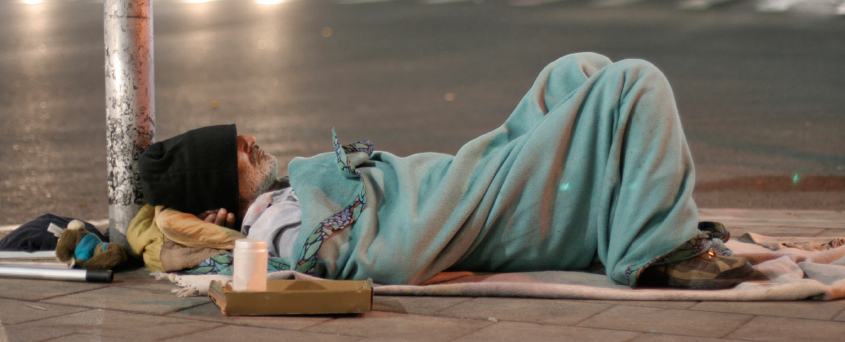
Feeding the Homeless Requires Religious Freedom
Chelsea Langston
Behavior is central to belief. Personal behavior stemming from belief — such as praying, worshipping, studying a sacred text, or spending time with people of the same faith — are generally accepted as legitimate actions closely connected to the practice of one’s faith. However, what happens when your faith, as virtually all religions do, calls you to step out and live your faith in public life?
The calling to serve others in the public square is an important tenet for many world religions. Muslims believe “(The righteous are those) who feed the poor, the orphan and the captive for the love of God, saying: ‘We feed you for the sake of God Alone; we seek from you neither reward nor thanks” (Quran, 76:8-9). Similarly, the Old Testament reflects the centrality of the tenet to serve the most vulnerable among us: “Give justice to the weak and the fatherless; maintain the right of the afflicted and the destitute” (Psalms 82: 3-4). Along the same lines, Hinduism expresses the principle of service to others as an essential practice of the faith: “Strive constantly to serve the welfare of the world […] do your work with the welfare of others always in mind” (Bhagavaa Gita 3.10-26).
In San Antonio, Texas, Joan Cheever has fed the homeless on a weekly basis for over ten years, but was recently issued a citation related to this practice. An NPR article about Cheever’s story, called “When Feeding the Homeless Runs Afoul of the Law,” reported: “The National Coalition for the Homeless says upwards of 30 cities have some kind of ban on distributing free food for the homeless. Many, including San Antonio, want to consolidate services for the homeless in one location–often, away from tourists.”
Cheever claims her actions are protected by the Texas Religious Freedom Restoration Act. Congress passed the Religious Freedom Restoration Act (RFRA) in 1993 in response to the Supreme Court’s ruling in the Smith case. In Smith, the Court said that because a law about illegal drugs was general and not targeted to harm religion, it could be applied against a Native American man who claimed that he smoked peyote, an illegal drug, as part of a religious ceremony. Congress considered such an interpretation of religious freedom to be inadequate and adopted RFRA as a remedy. RFRA says that if a generally applicable law substantially burdens a person’s sincere exercise of their religion, the law can only be applied if the government can prove it has a compelling interest for the burden and there is no less burdensome way to protect that interest.
Four years later, in City of Boerne v. Flores, the Supreme Court ruled RFRA applies only to the federal government and not to the states. In response, many states have adopted their own state RFRAs or have amended their constitutions to reflect the RFRA principles. Texas has a state RFRA that Cheever plans on appealing to.
The question in Cheever’s case is whether the San Antonio ordinance actually “substantially burdens” Cheever’s practice of her faith. This month, Cheever is challenging the ticket in court. Religious freedom scholar Douglas Laycock commented that a look at the several cases in jurisdictions around the country regarding providing food to the homeless and religious liberty shows that the courts have been divided.
Laycock speculated to the Huffington Post in April that Cheever’s legal situation could hinge on how burdensome the city of San Antonio’s permitting process is. “If she really doesn’t qualify for a permit, because of some reason related to the safety of the food, the court may be more deferential and less protective,” Laycock remarked. “But it sounds like that is not the most likely possibility.”
It remains to be seen what the court will make of Cheever’s religious freedom claim.
What is clear though, is that Cheever’s story has drawn national attention to a positive example of the practice of religion that RFRA was designed to protect. In recent months, religious freedom in America has become synonymous in the minds of many with policy stances on controversial issues such as same-sex marriage and abortion. These are among the issues that are very important to many religions, but they are only part of the story. Service to the needy is a major theme for many religions as well. And thus, only discussing religious freedom with examples related to sexual and reproductive standards does a disservice to the totality and spectrum of faith practices in public life that religious freedom for individuals and organizations seeks to protect.
The Institutional Religious Freedom Alliance (IRFA) is working to change the public perception about what religious freedom for faith-based nonprofit organizations is all about. Faith-based service organizations, at their core, are trying to live out the calling of their most sincerely held religious beliefs to participate in restoring justice through their distinctive, faith-driven purposes.
Issues around religious groups feeding the homeless are an illustration of the importance for faith-based nonprofit organizations to do the following:
1. Advocate for public policy that upholds their ability to practice their faith in public life
2. Embody internal best practices centered on advancing their faithful mission and
3. Cultivate a positive public perception that connects the excellent services their organizations provide to their religious identity.
IRFA’s focus is to equip faith-based organizations to advance their own religious freedom, and religious freedom for groups of all faiths, by engaging in and embodying the policy, practice, and public perception model.
